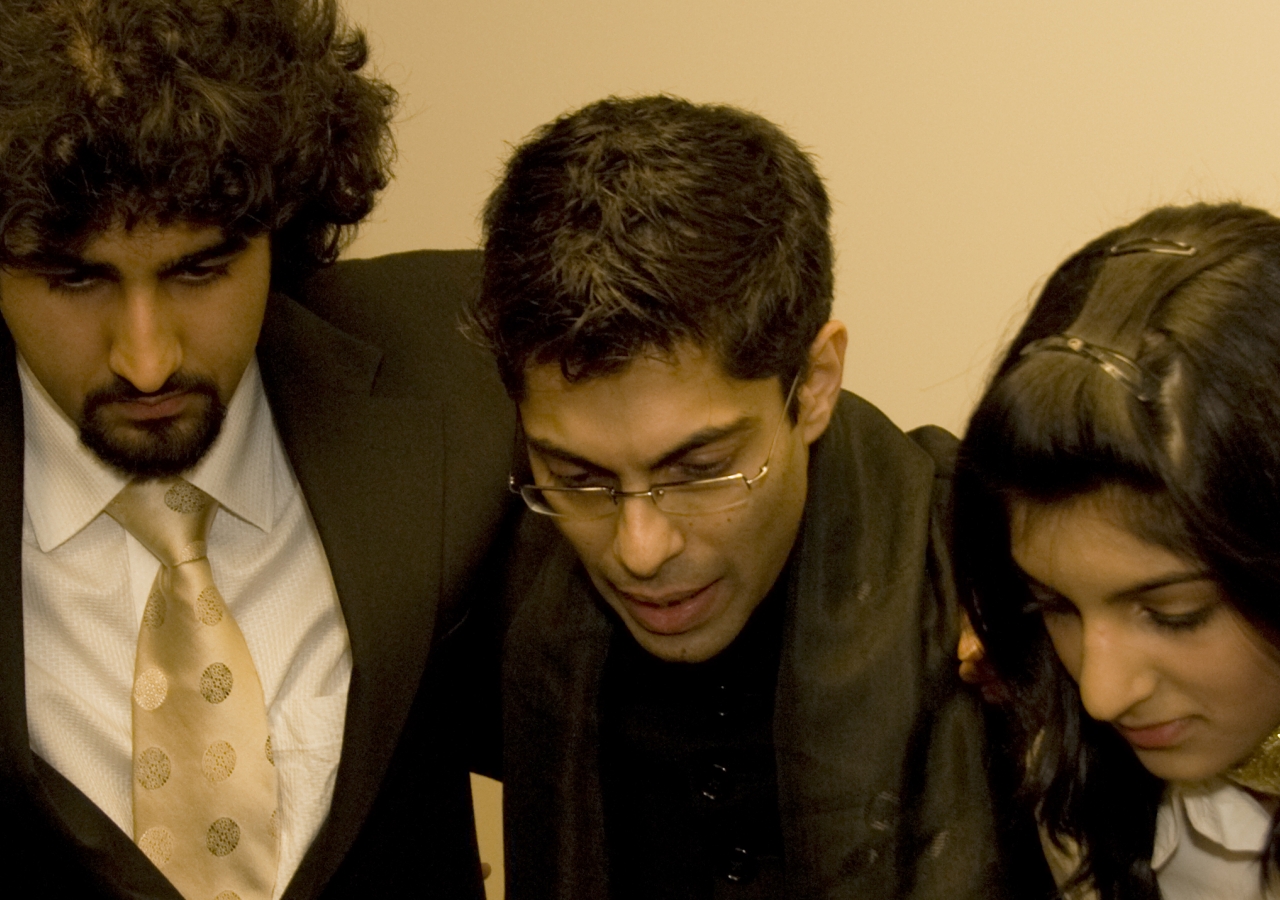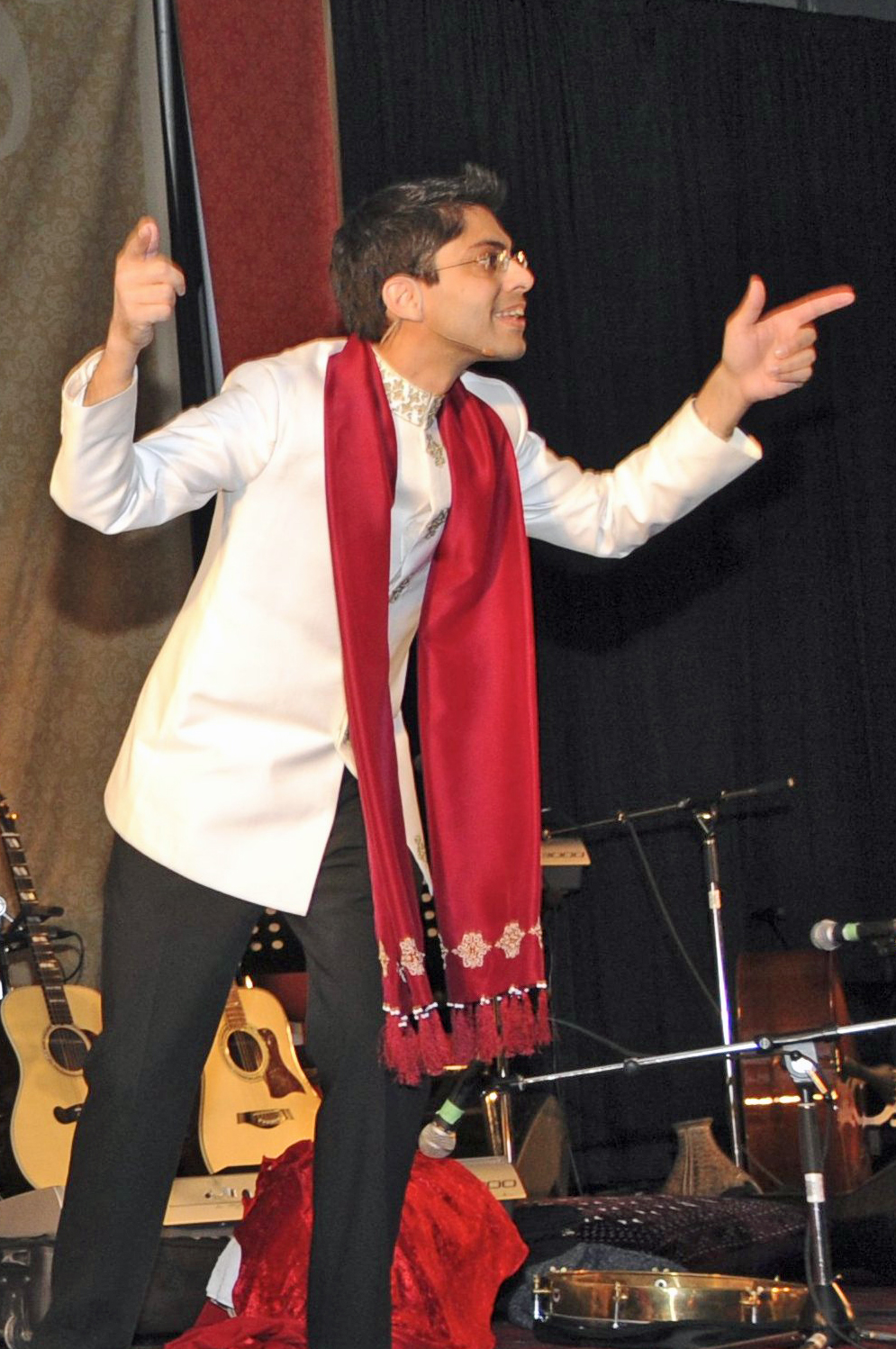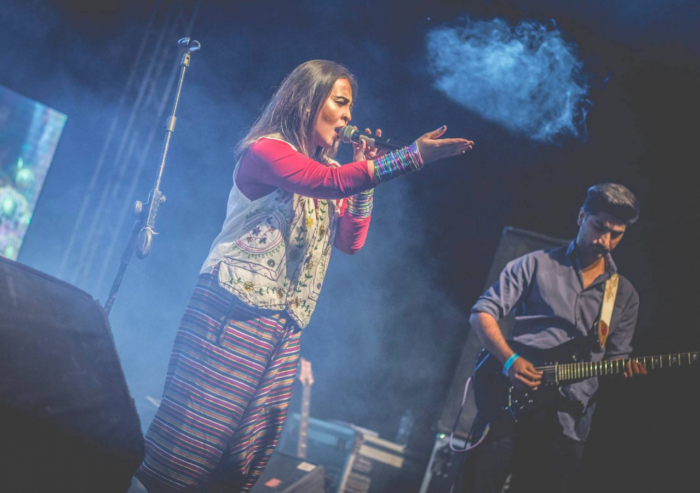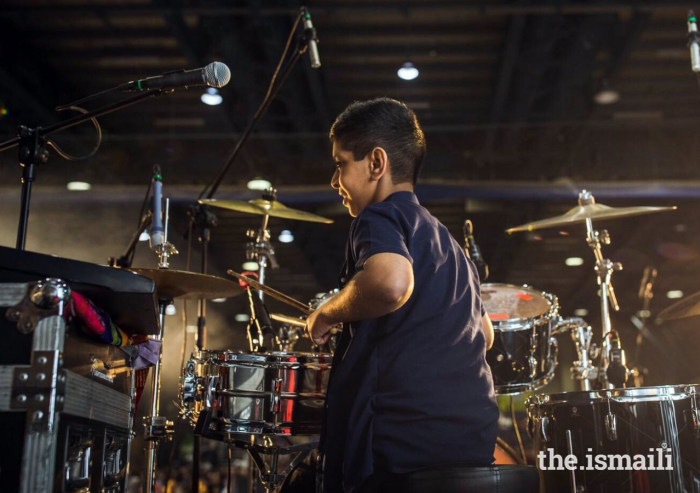In 2004, Hussein Janmohamed found himself overcome by the incessant hooting of matatus near the Likoni Ferry terminal on Mombasa Island in Kenya. A cacophony to some, the privately owned minibus-taxis sounded harmonious to Janmohamed's ear. Melding with their hooting was the overlay of adhan from neighbouring masjids.
Together, the matatus and the adhans were a musical inspiration to Janmohamed, who was at the time teaching at the Aga Khan Academy, Mombasa. The result was Mombasa Matatu Meditation, one of Janmohamed's several original compositions. It would be later be recorded by The Esoterics, a vocal ensemble from Seattle, Washington.
An intercultural excursion
Thus has been Janmohamed's musical journey – transcending geographies, cultures and religions.
Born in Nairobi, Kenya and raised in the Alberta town of Red Deer, Canada, Janmohamed grew up exploring his passion for music by singing with Judeo-Christian choral ensembles. Bridging the cultural gap, he trained by singing the songs of other faiths and cultures and excelled at it.
Counter-intuitively, “there was something about the experience of singing in choirs that brought me closer to my faith,” recollects Janmohamed. “It was like through the music of others, I connected and understood my faith better.”
Today, as an accomplished music educator, singer, composer, producer, and musical director of the Canadian Ismaili Muslim Youth Choir (CIMYC), the personal Muslim experience continues to inspire Janmohamed. “Composing music that is rooted in my Muslim heritage in some way,” he says, “gives me a way to share my faith in a public setting” without getting caught up in discussions of theology.
That inspiration anchored his recent compositions, including Nūrun' alā Nūr / Light Upon Light!, which was commissioned by the Canada Council for the Arts. It's premiere in March 2010 was performed by the world renowned Elmer Iseler Singers, a professional chamber choir based in Toronto. “Given that I had always sung Western sacred inspired choral music throughout high school, college, and university, it touched me deeply to hear a work rooted in my own cultural heritage performed by a non-Muslim choir,” he reflects.
With a Masters Degree in Music (with a concentration on Opera Production), Janmohamed's intercultural excursion is dotted with accomplishments. In 2002, working with the Ismaili Council for Canada, he produced Yaqzan, a nationally touring music and dance production based on the story of Hayy Ibn Yaqzan. A grant from the Canada Council for the Arts has allowed him to research and compose choral music inspired by or rooted in Muslim heritage.
The Ismaili Muslim Youth Choirs
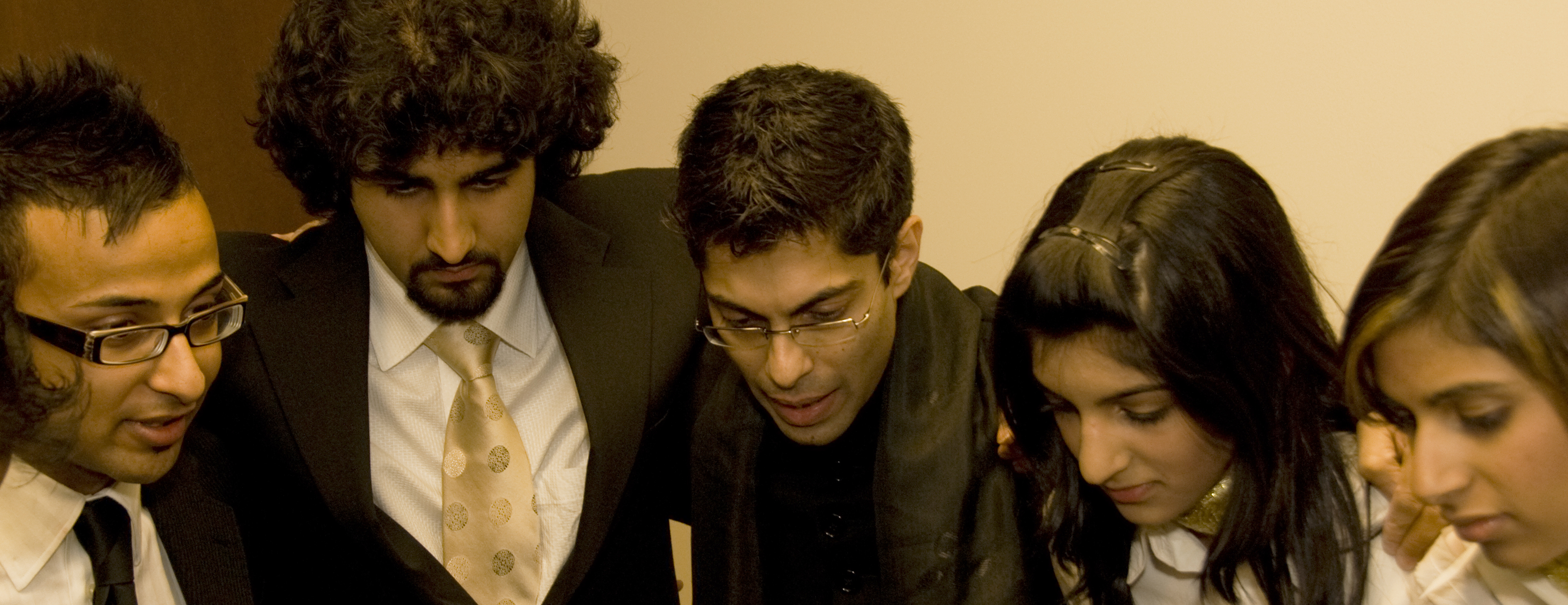 Hussein Janmohamed (centre) in a pre-show huddle with members of the Canadian Ismaili Muslim Youth Choir at a performence in Edmonton. Phil Musani
Hussein Janmohamed (centre) in a pre-show huddle with members of the Canadian Ismaili Muslim Youth Choir at a performence in Edmonton. Phil MusaniJanmohamed credits the Vancouver Ismaili Muslim Youth Choir, which he founded and which later laid the foundations for his role with the CIMYC, for helping him discover his musical roots and for defining his evolution as an artist.
The Vancouver Choir initially focused on folk and popular songs, gradually engaging in a collective and organic exploration of their faith and identity. “We attempted to select diverse music that would be familiar to members of our community through melody, rhythm, language, or intonation,” says Janmohamed. “We also improvised a lot with singing harmony to ginans, to dhikr,” – traditional Muslim devotional recitations – “and layering different pieces of music with each other. This experimentation sowed the seeds for my work and interest in intercultural compositions.”
With the CIMYC, Janmohamed showcased the group's work with the release of an a cappella choral music album and conducted the group's sixteen young singers in live performances before Mawlana Hazar Imam at the groundbreaking ceremonies of the Delegation of the Ismaili Imamat in Ottawa, and of the Aga Khan Museum and Ismaili Centre in Toronto.
Inspired by the Muslim experience
Fez Meghani, founder and Chief Creative Officer of Texas-based PlaneTunity Records, also finds his rhythmic and lyrical inspiration in Ismaili devotional recitations.
Meghani and Aftab Ali, the company's Director of Music Production, filmed their song Oh Allah at Al-Azhar Park in Cairo precisely at sunset. “The city glimmering under a warm, soulful sun during the month of Ramadan, and then the more than 30 mosques in the area all blaring the adhan within split seconds of each other was a spiritually uplifting experience,” reminisces Meghani.
Another song by Meghani, titled Every Breath, is written from the perspective of one of the birds in Farid ud-Din Attar's 12th century classic The Conference of the Birds. The song was written after a devotional recitation during which, following mention of Attar's work, the qasida Dum Hama Dum Ali Ali was performed.
Indeed, the very title of Meghani's recent album From One Soul is based on the Quranic proclamation of the whole of humanity being created from one universal soul. “It's an album that covers my identity and values of faith as a Muslim as well as the Islamic ethics of peace, love, hope, and generosity,” says Meghani.
Embracing diverse experiences
The inspiration drawn from their personal experiences is not enough for Janmohamed and Meghani. They aspire to embrace the universal, transcendental, spiritual, and physical power of music to share and to understand the experiences of others. “Music is a way to experience other cultures and civilisations at their heart,” summarises Janmohamed.
In London, Naseem Jivraj, trustee and founder of the Zamana Foundation, who was also a founder of the Ismaili Community Ensemble, agrees: “Music is the language of the soul that has the ability to transcend manmade barriers, acting as a bridge, bringing people and communities together. It gives a performer expression without the confines of language and the listener freedom for personal interpretation and meaning.”
 Pandemonium, the Morley Chamber Choir and the Ismaili Community Ensemble perform “Expressions from the Abrahamic Traditions” together at Cadogan Hall. Naveed Osman
Pandemonium, the Morley Chamber Choir and the Ismaili Community Ensemble perform “Expressions from the Abrahamic Traditions” together at Cadogan Hall. Naveed OsmanWith the staging of Expressions from the Abrahamic Traditions in 2011, Jivraj saw this sentiment transformed into a concrete project. Conceived by the Ismaili Community Ensemble with facilitation from the the Three Faiths Forum, the performance featured seventy musicians from the three Abrahamic communities performing in friendship and harmony at London's Cadogan Hall. Under Jivraj's guidance the Ensemble, has collaborated with the Jewish Music Institute at the School for Oriental and Asian Studies, the Morley Chamber Choir at Morley College, the Royal College of Music, and the Royal Philharmonic Orchestra.
The power of music to transcend physical differences also resonates with Meghani: “Music is a language to converse with God and His creation by overcoming barriers of dialect, traditions, and cultures,” he says. It brings people together because it is a voice for happiness, grieving, celebration, and healing, all at once.
Indeed, as Janmohamed eloquently puts it, “music is a sonic response to the experience of life itself.”

